Topic 1 Section A
Unit2__Topic1__SectionA精品课件-精品课件

资料下载:/ziliao/
范文下载:/fanwen/
试卷下载:/shiti/
教案下载:/jiaoan/
PPT论坛:
PPT课件:/kejian/
语文课件:/kejian/yuw en/ 数学课件:/kejian/shuxue/
Unit 2 Topic1
He has a big head
Section A
-
head
hair eyes nose mouth ears
face neck
Hi! 你看我的眼睛像不像字母e, 鼻子是nose 的首字母,嘴像不像mouth的第一个字母m, 耳朵里藏着小小的e,还有我的头花可是h形 的哦!你能记住我的样子吗?
We _h_a_v_e_ big ears.
They h_a_v_e__ small eyes.
It _h_a_s__ a long neck.
4
Work alone
B. Look at the picture and fill in the blanks.
This boy has a small face, small eyes, a big nose, a wide mouth and big ears. His hair is short.
15、一年 之计, 莫如树 谷;十 年之计 ,莫如 树木; 终身之 计,莫 如树人 。2021 年4月下 午12时 13分21 .4.221 2:13Ap ril 22 , 2021
16、提出 一个问 题往往 比解决 一个更 重要。 因为解 决问题 也许仅 是一个 数学上 或实验 上的技 能而已 ,而提 出新的 问题, 却需要 有创造 性的想 像力, 而且标 志着科 学的真 正进步 。2021 年4月22 日星期 四12时 13分0 秒12:13 :0022 April 2021
仁爱八年级上册第一单元Topic 1SectionA(共36张PPT)
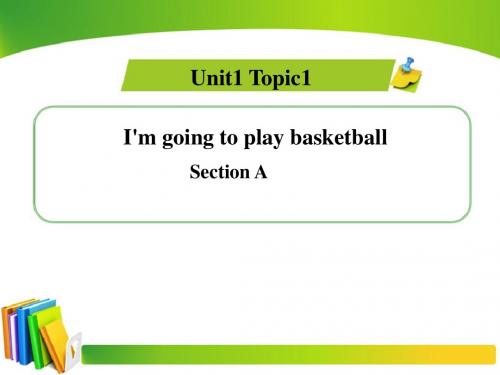
They are going to play table tennis.
What is he going to do after class? He is going to play basketball.
What is she going to do after class? She is going to play badminton.
on Sunday
eg: Michael is going to play basketball.
Super Brain
Look at the conversation between Chen Changsheng and Xu Yourong. Then fill in the blanks according to 1a.
B. He likes basketball.
C. He likes football.
Listen and guess !
---What sport does she like? --- __________________ A. She likes table tennis. B. She likes rowing. C.She likes football.
Watch and mark T (True) or F (False).
1.Michael is going to play football. he has to practice every day. 4.Both Michael and Kangkang hope their
team will win. ( )
Kangkang and Michael are talking about_______.
Unit 2 Topic 1 Section A(解析版)
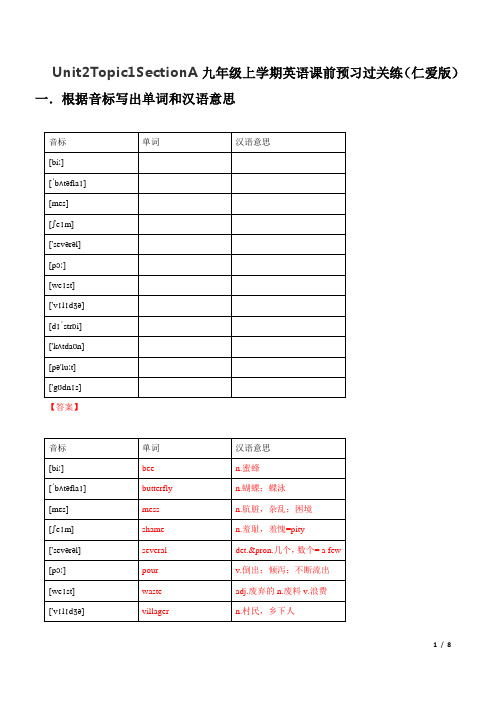
Unit2Topic1SectionA九年级上学期英语课前预习过关练(仁爱版)一.根据音标写出单词和汉语意思【答案】实战演练:根据首字母提示补全单词。
1. There are s boys playing soccer on the playground.2. Don’t w even one drop of water, because the earth is very short of water.3. Humans have p their own environment themselves.4. Oh, what a m ! Environment has been totally destroyed by those factories.5. What a s ! Those beautiful flowers are dead because of the poisonous (有毒的)soil.【答案】1. several2. waste3. polluted4. mess5. shame二.短语译一译1.看见某人正在做某事2.看见某人做了某事3.几个4.多么杂乱啊!5.多么可惜啊!6.把…倒入…7.砍倒8.消失【答案】1.see sb.doing sth.2.see sb.do sth.3.several=some=a few4.What a mess!5.What a shame !6.pour ...into…7.cut it / them down8.be gone / disappeared三.知识点理一理1.You could see bees and butterflies dancing.你可以看到蜜蜂蝴蝶在飞舞。
see sb doing sth.——看到某人正在做某事例:I saw her cleaning the classroom.我看到她正在扫打教室。
(强调正在做某事)see sb do sth ——看到某人做过某事eg:I saw her clean the classroom.我看到她打扫教室了。
Unit 1 Topic 1 Section A
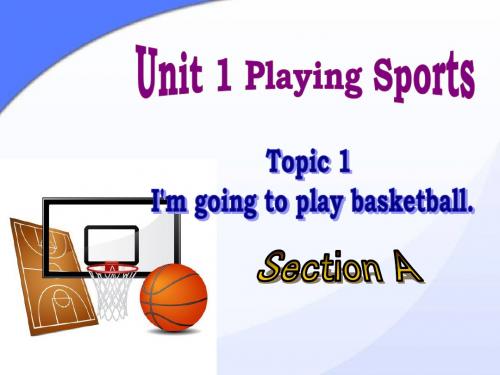
提示词 basketball football swimming running volleyball table tennis cycling rowing skating skiing
Which sport do you like better ,…or…?
I like …better.
提示词 Do you … much?=Do you often…? basketball football Yes, quite a lot.=Yes, I do. swimming No, seldom.=No, I don’t. running volleyball 很少 table tennis Do you row much? cycling No, seldom. rowing skating Yes, quite a skiing bit /a lot.
跑步 滑冰 滑雪 游泳 骑自行车 划船 潜水 射击
明天早上听写这些单词
Listen to 1a and choose the correct answer.
录音1a-P1
Kangkang and Michael are talking about _________. A.the football game on Saturday
A: Are you going to join the school … team?
B: Yes, I am. / No, I’m not. I’m going to … 队,组
Do you prefer playing basketball? Are you going to join the school basketball team?
Michael is going to play _________ basketball because he and his classmates are going to have a basketball game ________ against Class Three on Sunday. All of them hope win their team will _______. Kangkang will go cheer them on. and ________
Unit6__Topic1__SectionA__参考教案

Unit6 Topic1 SectionA 参考教案Ⅰ. Material analysis本节课为该话题的第一节课,建议用1课时上完。
主要活动为SectionA的1a和3。
本单元教学内容主要围绕旅游和交通方面的话题展开。
话题一主要让学生学习如何用英语谈论旅游,如何用英语预订车票、房间,如何为旅游筹集资金、制订出行计划等。
动词不定式是本话题的重点语法项目。
本课通过让学生掌握旅游地点、交通方式和所需费用等常识,掌握黑体单词和短语field, proper,total, go on a visit to … 和decide on…, 理解白体词汇mount, vehicle, airline, partner和suitable, 掌握动词不定式的用法,同时教育学生要学会制订计划;培养学生热爱旅游、积极探索的态度。
Ⅱ. Teaching aimsKnowledge aims:1. 学生能正确拼读并运用黑体单词。
2. 学生能正确运用以下短语造句:go on a visit to …, make a decision, too…to…和decide on…3. 学生能自如地运用以下句式进行交流:I have some exciting news to tell you.We’re going on a three-day visit to Mount Tai.It will take us a few days to get there by bike.It costs …Let’s decide.We’ll decide on the best way to travel on our fie ld trip.4. 学生能简单地掌握动词不定式的用法。
Skill aims:1. 能听懂有关旅游的短文或对话,并从中获取信息。
2. 能使用英语与他人谈论关于旅游的话题。
3. 能理解有关旅游、预订等方面的叙述,并从中获取需要的信息。
Unit2 topic1 sectionA 教案

Pollution has caused too many problemsSection A (1a-1c)Teaching aims1.Knowledge aims:掌握本课的重点词汇和短语,巩固一般过去时和现在完成时的用法和区别。
能够用一般过去时和现在完成时描述过去和现在的变化。
正确使用there be sth./sb. doing sth.来表达“有某人/物正在做某事”。
2.Skill aims:能听懂描述环境变化的对话,区别一般过去时和现在完成时的用法。
能理解和运用一般过去时和现在完成时来进行听、说、读、写活动。
3.Emotional aims: (optional)让学生了解环境污染的严重性,并树立环保意识。
4. Culture awareness: (optional)通过课文的学习,让学生了解环境的变化,关注全球的环境问题。
Key points:Words and phrases: bee, butterfly, mess, shame, several, pollute, waste, villager, destroy, cut down, goodness, pour,see sb./sth. do sth., see sb./sth. doing sth., cut down, my goodness Sentences: What a shame! / What a mess!The flowers and grass have gone!What has happened here?There be sth./sb. doing sth.There are several factories pouring waste water into the stream.Everything has changed.Grammar: differences between Simple Past and Present Perfect tense.Difficult points:正确使用there be sth./sb. doing sth.来表达“有某人/物正在做某事” 。
Unit 1 Topic 1 Section A(解析版)
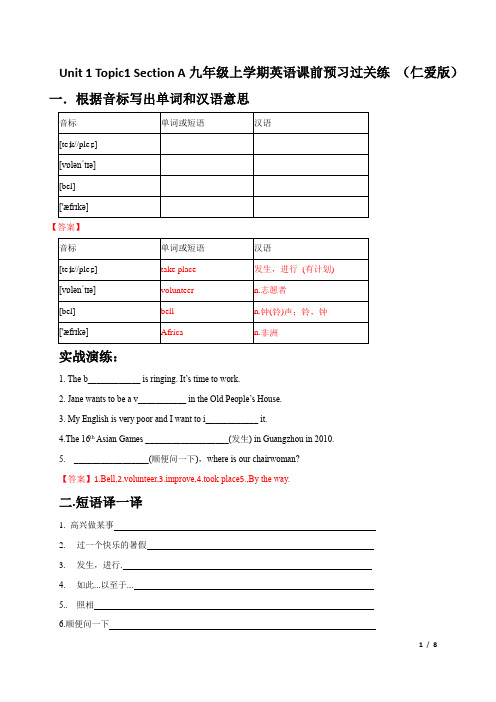
Unit 1 Topic1 Section A九年级上学期英语课前预习过关练(仁爱版)一.根据音标写出单词和汉语意思【答案】实战演练:1. The b____________ is ringing. It’s time to work.2. Jane wants to be a v___________ in the Old People’s House.3. My English is very poor and I want to i____________ it.4.The 16th Asian Games ___________________(发生) in Guangzhou in 2010.5.---_________________(顺便问一下),where is our chairwoman?【答案】1.Bell,2.volunteer,3.improve,4.took place5.,By the way.二.短语译一译1.高兴做某事2. 过一个快乐的暑假3. 发生,进行.4.如此...以至于...5.. 照相6.顺便问一下7. 已经去了...【答案】1.be happy to do sth.2.have a good summer holiday3.take place4.so...that..5..take photos6.by the way7.have gone to三.知识点理一理:熟读1a的对话,找出以下句子的共同点。
Rita, you have just come back from your hometown.Great changes have taken place there and my hometown has become more and more beautiful.I have been to Mount Huang with my parents.I have been to an English summer school to improve my English.She has gone to Cuba to be a volunteer…..思考:以上句子都使用了现在完成时,可以看出现在完成时的结构为______________________.【答案】Have /has +动词的过去分词思考:表示“曾去过某地”用__Have /has been to__________+地点;表示“到某地去了”用_____Have /has gone to____________+地点。
Topic+1+Section+A

Make sentences with the following phrases.
have/has been to 与have/has gone to
1. changing 是现在分词 作名词的前置 是现在分词,作名词的前置 定语,它与被修饰词有主谓关系. 定语 它与被修饰词有主谓关系. 它与被修饰词有主谓关系 e.g.: a crying girl 一个哭泣的女孩
2. have come 现在完成时态.现在完成时 现在完成时态. 由助动词" 由助动词"have/has" +动词的过去分 动词的过去分 词构成, 词构成,表示过去发生或完成的某一 动作对现在造成的影响或结果, 动作对现在造成的影响或结果 可与 just, already, yet等表示时间的副词连 等表示时间的副词连 用.
6. There goes the bell.=The bell is ringing.= That's the bell. 铃响了. 铃响了. 此句是倒装语序. 此句是倒装语序. e.g. There goes the bus. 公共汽车来了. 公共汽车来了. Look! Here he comes. 看! 他来了. 他来了. Here you are. 给你. 给你.
1a Look, listen and answer these questions.
1. Where has Rita been? She has been to many places near her home in India. 2. Where has Jane been? Jane has been to Mount Huang with her parents.
5. — Hello, this is Lily speaking. Could I speak to Mr. Black? — Sorry. He _____ Xuanwu Lake C Park. A. has been to B. went to C. has gone to D. will go to
八年级上册知识点击Unit1Topic1

Unit 1 Topic 1 Section A芝麻开门New words :New phrases :Useful expressions:知识点击1.—What are you going to do?你打算做什么?—I’m going to play basketball.我打算打篮球去。
be going to后面接动词原形,表示即将发生的动作或情况。
be动词随着主语的人称和数的变化而变化。
如:Maria is going to watch TV.玛利亚打算去看电视。
They are going to play football.他们打算去踢足球。
它的一般疑问句形式是直接把be动词提到句首。
如:Are you going to play soccer tomorrow?你打算明天踢足球吗?2.1 often saw you play basketball during the summer holiday.我经常看见你在暑假期间打篮球。
(1)see sb. do sth.意为“看见某人做某事”,强调看到动作的全过程。
而see sb. doing sth.意为“看见某人正在做某事”,强调动作正在进行。
如:I often see Tom play soccer on Sunday afternoon.我经常看见汤姆在周日下午踢足球。
When I passed by, I saw a girl singing an English song in the classroom,当我经过时,我看见一个女孩正在教室里唱着英文歌。
类似用法的动词还有feel, hear, watch, listen to等。
如:I often hear Ann play the piano after school.放学后,我经常听到安弹钢琴。
Look! Mr.Zhang is watching his son swimming.看!张先生正在看着他儿子游泳。
七年级上册仁爱英语教材讲解Unit1知识点击

Unit 1 Topic 1 Section ANew wordsNew phrasesUseful expressions知识点击1. Good morning!早上好!此句为早上或上午见面互相打招呼时所用的问候语。
它的答语仍然用“Good morning!”。
如:—Good morning, Kangkang!早上好,康康!—Good morning, Michael!早上好,迈克尔!在非正式场合,朋友和家人之间,可以省略good,只用morning问候。
如:Morning, Mom!早上好,妈妈!【拓展】其他时间段的问候语还有:Good afternoon!下午好!Good evening!晚上好!Good night!晚安!以上三个问候语也用同样的句子来回答。
【注意】“Good night!”不是问候语,而是人们在晚上分别时或睡觉前的道别用语,意为“晚安!",答语仍然是"Goodnight!"2.I’m Kangkang,我是康康。
英语中常用I'm...句型进行自我介绍。
如:I'm Maria,=I am Maria.我是玛丽亚3.—Welcome to China!欢迎到中国来!—Thank you.谢谢你。
Welcome to Beijing!欢迎到北京来!Welcome here!欢迎到这里来!当对方用welcome表示欢迎时,常用"Thanks./Thank you./Thanks a lot.”来回答。
如:—Welcome to Shanghai, Kangkang!康康,欢迎你到上海来!—Thanks.谢谢。
【拓展】“you’re welcome.”意为“不客气。
”如:—Thank you.谢谢你。
—You're welcome.不客气。
4.Hello!/ Hi!你好!“Hello!”和“Hi!”一般用于熟人之间互相打招呼,语气比较随意,常用于非正式场合,使用时不受时间限制。
Unit 3 Topic1 SectionA 教案 仁爱版九年级英语上册

九年级上册Unit 3 Topic 1 English is widely spoken throughout the world.Section A【教学构思】一、教材分析:本课属于课标话题人与社会——“语言学习(Language learning)”中语言学习经历(Language learning experiences)项目,主要通过Kangkang,Li Xiang和Wang Junfeng的对话谈论王俊峰即将去迪士尼乐园,他将有一个好机会练习英语。
主要教学活动为1a,2a,2b和3,通过通过Kangkang,Li Xiang和Wang Junfeng的对话谈论王俊峰即将去迪士尼乐园,他将有一个好机会练习英语,学习被动语态am/is/are+past participle的用法以及谈论将来打算和表达愿望的表达法。
在2a和2b练习中,进一步训练被动语态am/is/are+past participle的用法。
在3听力活动中,训练学生通过听力获取细节信息的能力,培养学生“听”的语言能力。
二、设计说明:根据学情和本课的语法及话题,本节课的教学设计将听与说相结合,以1a为载体,立足话题,聚焦语法,通过听说练习内化知识;在语言生成阶段,循序渐进,帮助学生学以致用,并通过同伴合作完成学习任务。
本课在重、难点突破的方法上有所创新,教师在2a练习中巩固被动语态am/is/are+past participle的用法,在2b的活动中应用实践,让学生熟练运用被动语态am/is/are+past participle。
【教学目标】1. 通过听力活动和朗读对话,掌握对话大意和细节,培养“听”与“读”的语言能力;2. 在对话和练习中学习一般现在时被动语态的用法,准确理解一般现在时被动语态的意义并用于表达;3. 通过小组活动,运用本课所学语言知识,发展思维品质、自主学习能力和团队协作意识。
【教学重难点】1. 正确使用被动语态am/is/are+past participle;2. 做汇报展示小组活动成果。
仁爱教案 Unit 2 Topic 1 Section A
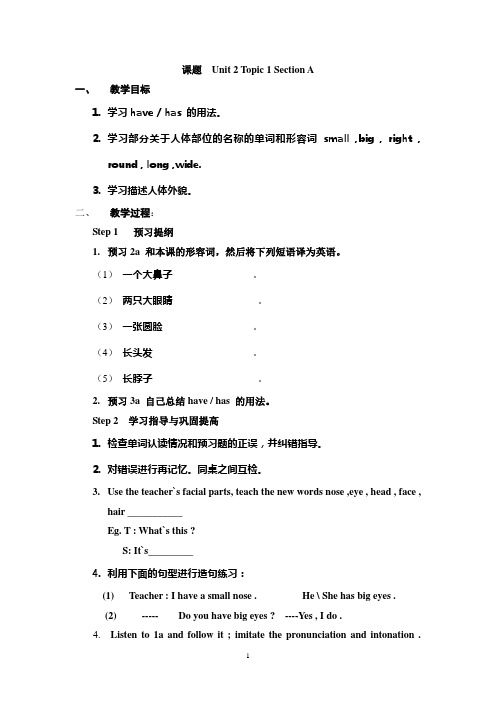
课题Unit 2 Topic 1 Section A一、教学目标1.学习have / has 的用法。
2.学习部分关于人体部位的名称的单词和形容词 small ,big , right ,round , long ,wide.3.学习描述人体外貌。
二、教学过程:Step 1 预习提纲1.预习2a 和本课的形容词,然后将下列短语译为英语。
(1)一个大鼻子________________。
(2)两只大眼睛_________________。
(3)一张圆脸__________________。
(4)长头发____________________。
(5)长脖子_____________________。
2.预习3a 自己总结have / has 的用法。
Step 2 学习指导与巩固提高1.检查单词认读情况和预习题的正误,并纠错指导。
2.对错误进行再记忆。
同桌之间互检。
e the teacher`s facial parts, teach the new words nose ,eye , head , face ,hair ___________Eg. T : What`s this ?S: It`s_________4.利用下面的句型进行造句练习:(1) Teacher : I have a small nose . He \ She has big eyes .(2) ----- Do you have big eyes ? ----Yes , I do .4. Listen to 1a and follow it ; imitate the pronunciation and intonation . Teach and let students master the sentence patterns of 1a .(1) I have a small nose .(2) ---Do you have big eyes ? --- Yes , I do .(3) Oh , I know .(4) Yes , you`re right .5. Act out 1a in pairs . Finish 1b .Step 3 Practice 练习1.Listen to 2a and follow it .2.Work in pairs .Play the game “ Touch your body” . Finish 2b.3.Listen to 3a , then finish 3b .4.让学生用3a中的句型描述自己及他人的外貌特征。
仁爱版英语八年级上册教材同步讲解及练习附答案

仁爱英语八年级上册Unit 1 topic 1Section A语言点讲解1.I saw you play basketball almost every day during the Summer holidays.常见的感官动词有:see, watch, hear, smell, feel 等。
后可接①动词ing形式,表此动作正在发生。
②动词原形,不表此动作正在发生, 表此动作已完成或存在的事实。
① Do you smell something ? (burn) 答案:burning② I often see him basketball after class. ( play ) 答案:play2.There is going to be a basketball game between Class Three and our class this Sunday.There be 句型:表某地有某物. 而have 表示某人有…(1)There is/ are..表现在某地有某物,is/are取决于后面的名词是单数还是复数,单数用is 复数用are,如①There is a pen and two rulers on the desk.②There are two rulers and a pen…(2) There was/were…表过去某地有某物。
was/were的用法也遵循就近原则。
(3)There will be 或There is/are going to be 表某地将有某事物。
不能说成There willhave…(题) a match in our school between Class Three and Class Four next week.3.Would you like to come and cheer us on? ----- Sure, I’d love to.(1)Would you like + 不定式?表建议或邀请。
Topic 1 Section A
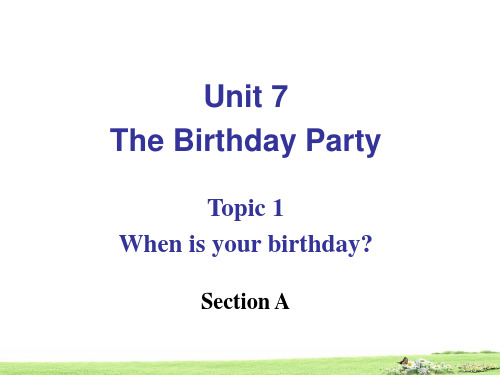
p /p/
help party pencil ...
ph /f/
elephant photo physics ...
3b Listen and circle the words with the sound /au/ or /əu/ .
/au/ route
phone
cow
how
low grow
group window blouse brown doubt /əu/ down yellow touch
Homework
Write the following years in English.
1700 1986 1847 1995 1902 2010
3000
3009
3025
writer (write) 1. The girl wants to be a ______ like Bingxin. mice (mouse)in 2.—Can you see any ______ the room? —No, there aren’t any. twelfth (twelve) 3. Tomorrow is Tom’s ________ birthday. Let’s give him some presents. fans (fan)in the bathroom 4.—Those ______ don’t work. • —You should call the service center for help. • 5.—Where ______ was (be)Meimei born? • —In Beijing.
4.—How many students does your school have? thousand (千). —About two __________ calendar (日历). What 5. Look at the ___________ day is today?
Topic1SectionA辅导

Unit 1 Topic 1 Section A 辅导一、词汇短语1.after class下课后after school 放学后2.come back from从---回来3.feel sorry for sb.为---感到难过feel sorry to do sth.4. have been (to )+地点:(某人)去过某地,人已经回来。
5. have taken part in 参加have helped 帮助have spent 花费,度过have done 做have learnt 学6.in a disabled children’s home在一个残疾儿童之家7. learn sth. from sb.向某人学习某事Eg: We learn English from him every day .我们每天向他学习英语。
8. no time to do sth.没时间做某事/ clean -----for---为---工作/清洁10. the whole holiday整个下午=all the holiday二、重点句子1. Did you have a good summer holiday?你暑假过得愉快吗?2. How was your trip?你的旅行怎样?3. In one place I saw children working for a cruel boss.在一个地方,我看见孩子们在为一个残忍的老板工作。
4. I felt sorry for them.我为他们感到难过。
5. A: Where have you been, Jane?简,你去过哪儿?B: I have been to Mount Huang with my parents.我和我的父母去过黄山。
: Where has he/she / kangkang been?他/她/康康去过哪儿?B: He has been to an English training school to improve his English.为了提高英语他去参加过一个英语培训学校的学习。
公开课Unit_3_Topic_1_Section_A
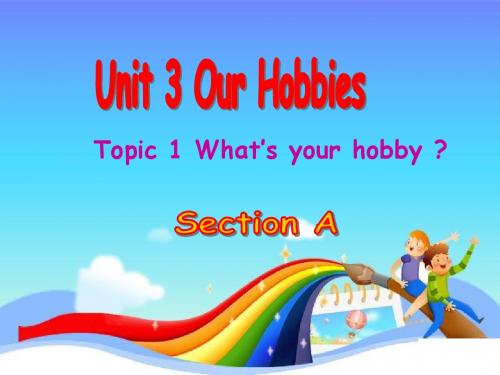
W
go fishing enjoy reading stories
W
H
go to the movie theater
H
love reciting poems
W
enjoy listening to music
H
watch DVDs at home
Read 1a and fill in the blanks. Helen and Wen Wei are talking about their hobbies. Wen Wei enjoys fishing ______, reading stories and listening _______ to music. He gets great ____ fun from these activities. reciting Helen enjoys ______ _ poems and watching _________ movies. She goes to the movie theater ________ a lot and also _______ DVDs rents and watches them at home.
Do some outdoor activities. 做室外活动 Maybe I need a change. 我可能需要改变一下
Listen to 1a and choose the correct answer. 录音 1a-P55 What are Helen and Wen Wei talking
I can say:
Why not go out and do some outdoor activities? Maybe I need a change.
2022年教学教材《Topic1 SectionA教材知识详解》优秀教案

Toe to choo,你通常怎么来学校?
— I uua come to choo b ubwa 我通常地铁来上学。
b为other go to wor 你妈妈怎样去上班?
—She goe to wor b bu =She goe to wor in/on a bu她乘公交车去上班。
表示交通方式还可以用“ride/tae/drive冠词交通工具〞,动词短语在句中做谓语。
例:He goe to choo b bie
=He goe to choo on a bie
=He ride a bie to choo他骑自行车去上学。
4 Oh,it’ time for ca Come on! 噢,到上课时间了,赶快!
1It’ time for ca意为“到上课的时间了。
〞“It’ time for 名词,意为
到……的时间了〞。
例:It’ time for choo到上学的时间了。
2Come on快点儿;加油;来吧。
例:Come on! Let’ dance together 来吧!我们一起跳舞吧。
It’ time to do th = It’time for…到做某事的时间了。
如:
It’ time for unch = It’ time to have unch到吃午饭的时间了。
Unit 1 Topic 1 Section A 任务单
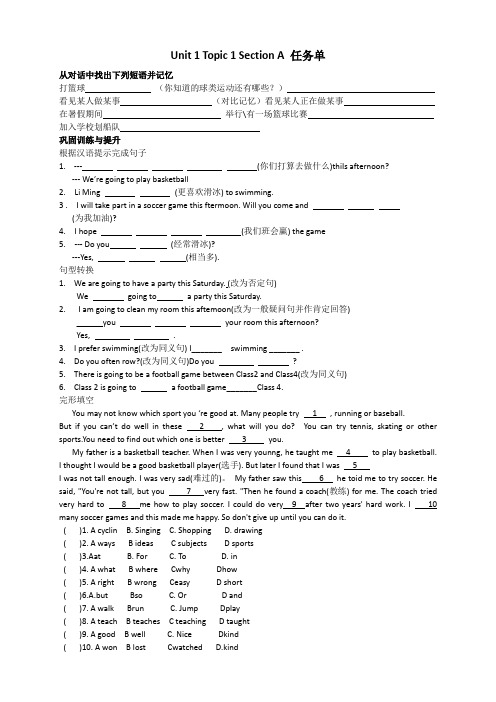
从对话中找出下列短语并记忆打篮球(你知道的球类运动还有哪些?)看见某人做某事(对比记忆)看见某人正在做某事在暑假期间举行\有一场篮球比赛加入学校划船队巩固训练与提升根据汉语提示完成句子1.--- (你们打算去做什么)thiIs afternoon?--- We’re going to play basketball2. Li Ming (更喜欢滑冰) to swimming.3 . I will take part in a soccer game this ftermoon. Will you come and(为我加油)?4. I hope (我们班会赢) the game5. --- Do you (经常滑冰)?---Yes, (相当多).句型转换1.We are going to have a party this Saturday. (改为否定句)We going to a party this Saturday.2.I am going to clean my room this aftemoon(改为一般疑问句并作肯定回答)______you your room this afternoon?Yes, .3.I prefer swimming(改为同义句) I_______ swimming _______ .4.Do you often row?(改为同义句)Do you ?5.There is going to be a football game between Class2 and Class4(改为同义句)6.Class 2 is going to a football game_______Class 4.完形填空You may not kno w which sport you ‘re g ood at. Many people try 1 , running or baseball.But if you can’t do well in these 2 , what will you do? You can try tennis, skating or other sports.You need to find out which one is better 3 you.My father is a basketball teacher. When I was very younng, he taught me 4 to play basketball.I thought I would be a good basketball player(选手). But later I found that I was 5I was not tall enough. I was very sad(难过的)。
- 1、下载文档前请自行甄别文档内容的完整性,平台不提供额外的编辑、内容补充、找答案等附加服务。
- 2、"仅部分预览"的文档,不可在线预览部分如存在完整性等问题,可反馈申请退款(可完整预览的文档不适用该条件!)。
- 3、如文档侵犯您的权益,请联系客服反馈,我们会尽快为您处理(人工客服工作时间:9:00-18:30)。
Warm-up
How do you usually come to school? I usually ...
What is your favorite way if you’re
going to travel?
My favorite way is ...
Why do you prefer...?
【例句】
A. We will go on a three-week visit there.
B. Sue came third in the five-kilometer
race.
C. James is an eight-year-old boy.
学情展示: 结论 以上3个例句中的复合形容词分别是 three-week ____________,____________ five-kilometer eight-year-old __________,
动 词,意为“ 决定、下决心 1. decide是___ ____________ ”。
2. decision是decide的___ 名 词形式。常见搭配
make a decision意为“ ______________”。 作决定、下决心
请根据汉语意思完成下列英语句子。 1. 他选定了一辆新车。
当它与被修饰的名词在语义上存在着介 宾关系时,动词不定式后需加必要的 介 词。 ___
5. 动词不定式作状语 A. I drove to the railway station to pick up my friend. B. The sun is shining. It’s too hot for us to go hiking.
③ Helen, your ______is to find out the task cost by bus. ④ Bring your information tomorrow
decide and we’ll _______on the best way
to go on our field trip.
Because ...
Guide1(学习单词) 1.自读P25-26单词(field-discuss), 然后跟读录音正音,比比谁读得准。(3′) 2.自己大声读背并尽力记住单词拼写, 三分钟后比谁记得牢。
学情展示
field ① We’re going on a spring _____
trip. ② It’s too far to cycle, but there are other ______ vehicles for us to choose.
根据句意来确定。
Pair work Discuss and choose the best way to
使役 动词(如 hear, feel, watch等)和______ make, have, let等)的后面常接不带 ____
(带 / 不带)to的动词不定式作宾语补足
语。
4. 动词不定式作定语 【例句】
A. The best way to travel is by car.
B. Please give me some paper to write the report on. 动词不定式作定语时,通常放在所修饰 的词的_______ 后面 。
C. As soon as we got home, it began
raining / to rain. D. Don’t forget to help me post the letter on your way to school. E. I shall never forget seei定式作宾语与v-ing形式作宾语
的区别
A. Most of the Chinese are practicing
speaking English to welcome the 2008 Olympic Games. B. Without your help I will fail to pass the exam.
when I passed the house.
C. The girl makes her pet dog run with
her every morning.
动词ask, tell, want, invite, teach等的后面 常接 带 ___(带 / 不带)to的动词不定式作 感官 动词(如see, 宾语补足语。但某些_____
动词不定式作状语时,表目的的情况较
多(如例句__ A ),也可表结果(如例句
___ B )。
6. 动词不定式作表语 Your task is to work out the cost.
系动词后面作表语。 动词不定式可放在______
二、动词不定式的特殊结构
1. 动词不定式的否定形式 My mother asked me not to play in the
home.
E. Mary decided on that red cap.
F. When can you make a decision on
this?
学情展示:结论 代 词(如例 其后可跟)__ 名 词(如例句A)、 ___ 句B)、__________________ 动词不定式(短语)(如例句C) 或______ 从句 (如例句D)等。短语decide on意 决定、选定 为“ ___________ ”。
/ 记着去做某事”,forget / remember
doing sth. 意为“忘记 / 记得曾经做过某
事”;go on to do sth. 意为“接着做
(另
一件事)”,go on doing sth. 意为“继
3. 动词不定式作宾语补足语
A. She asked me to speak loudly. B. I saw a man climb into the window
He __________ decided on a new car.
2. 吉姆决定戒烟。
Jim ___________________ made a decision to /
___________________ decided that he would give up smoking.
3. 他们现在不能决定任何事情。 They can’t ______________ decide anything now.
Wall for the first time.
v-ing形式 有些动词之后一般用_________v-ing 形式 / 动词不定式)作宾语,如enjoy, mind, practice, keep等。有些动词之后一般用 ____________ 动词不定式 (v-ing形式 / 动词不定式) 作宾语,如plan, agree, decide, fail等。 有些动词之后既可用v-ing形式又可用动 词不定式作宾语,二者没有什么区别,
其中例句A和B中的复合形容词由“数 ___ 词+ ___ 名 词”构成,例句C中的复合形容 数 词由“ ___词 +名 ___词 +形容 _____词”构成。 这些复合形容词中的名词都用____ 单 数。
2. Bring your information tomorrow and we’ll decide on the best way to go on our field trip. decide on /upon sth.决定,选定 We’re trying to decide on / upon a school. 我们正在设法选定一所学校。
street.
not 动词不定式的否定形式由“ ____ + 动词
不定式”构成。
2. “疑问词 + 动词不定式”结构
I don’t know what I should do.(改为
同
义句) →I don’t know what to do. 从句 “疑问词 + 动词不定式”结构常可与 ______互相转换,疑问词的选用需
decide与decision 仔细观察下面的例句,分析decide与 decision的用法,然后补全结论部分所 缺的内容。
【例句】
A. His father will decide the matter for
him.
B. She must decide that herself. C. Jed decided to go to bed early. D. My sister decided that she must go
Guide 2 :
questions:
Look, listen and learn.
Listen to 1a and answer the following ① Where will they go? ② What’s Kangkang’s task? ③ What’s Helen’s task?
1. I have some exciting news to tell you. 2. It’s hard to say. 3. It will take us a few days to get there by bike. 4. There are other vehicles for us to choose. 5. Do you know the best way to get there? 6. You two find out the cost to go by train? 7. Your task is to find out the cost by bus. 8. I’d love to go by airplane. 9. We’ll decide on the best way to go on our field trip.
